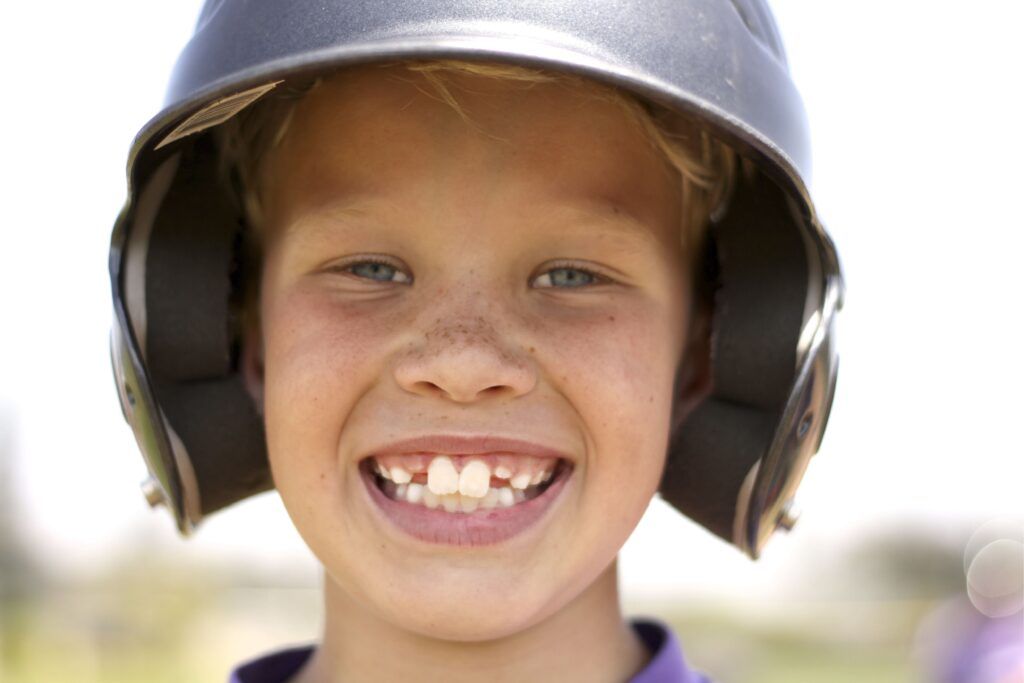Protruding teeth, also commonly referred to as buck teeth, can be a special kind of problem for your kids. Because of the ways they protrude, the upper teeth and the lower teeth can create gaps in your child’s smile and cause problems with brushing and flossing. But it can be easy to ignore this problem, especially if it doesn’t interfere with their speaking and eating habits. However, even mild protrusions can cause long-lasting problems for their oral health. In short, having buck teeth can cause premature tooth decay, bite misalignments, and can increase the risk of gum disease at an early age.
But how do children get protruding teeth? What are the long-term consequences of having protruding teeth into adulthood? And how have dentists been tackling the issue of overbites in children’s teeth? Children that have protruding teeth present an ever-present problem for dentists and orthodontists attempting to provide them with childhood oral care, especially with the rapid growth of dental problems in today’s age. Nevertheless, we’re here to help you get your children the care they need and explain all the details about why it’s important to correct protruding teeth.
What Causes Buck Teeth To Occur In Children?
Overbites can occur for multiple reasons, and these improper bites are some of the most prominent types of misalignments found in children. Overbites appear when the upper front teeth jut over the lower set of teeth, and in a normal, healthy bite, the top teeth sit snug and aligned over the bottom teeth. In some cases, it can be difficult to tell if your child has a misaligned bite, especially if their protruding teeth appear minor. In many cases, more blatantly obvious overbites are most often treated by orthodontists and dentists because of their clear appearance and the harmful effects they have on the child’s teeth.
But when mildly or severely formed protrusions occur, what causes them? When it comes to protrusions and overbites, these dental conditions can be affected by numerous factors, including:
- Genetics: Most cases of overbites are caused by genetic factors. Overbites and protruding teeth of any sort can be passed down genetically from the parents and even the grandparents, making it challenging to prevent in most cases.
- Thumb-Sucking: Thumb-sucking that goes beyond the recommended age is often the main habit that causes this condition. Children predisposed to sucking their thumbs during the period when their baby teeth begin to come in can harm the growth and movement of the teeth, causing overbites to appear.
- Crowding/Spacing: In some cases, teeth that are overcrowded due to the presence of wisdom teeth and other unhealthy habits can cause overbites to occur at a young age.
- Tongue Thrust: Some children have a habit of forcing their tongue along the front of their teeth, and during the time when their baby teeth are coming in, this can exert a constant pressure that causes the teeth to push forward.
Although these causes are highly prevalent among children today, many parents prefer to avoid orthodontic treatment and simply let their children have protruding teeth. These protruding teeth, however, are most likely to cause significant stress for those children, increase the likelihood of injuries, and cause an immeasurable amount of dental problems for that child later on in life.
Why Correct Your Child’s Protruding Teeth
Correcting buck teeth is especially vital for their oral health, as these issues can present them with long-term consequences that leave them with more than just unhealthy teeth. In many ways, our oral health can be a huge indicator for our overall health; controlling the microbiome of healthy bacteria entering our systems and can contribute to a higher risk of disease.
- Gum Disease: One of the largest issues present among those with protruding teeth is gum disease. Protruding teeth can leave pockets of bacteria behind in the grooves and fissures of the mouth, even with proper brushing and flossing. When that occurs, those areas of bacteria can infect the gumline, as the gums are more vulnerable to protruding teeth. Gum disease, when left untreated, can turn into periodontal disease, causing massive amounts of decay and jawbone loss later on in life.
- Tooth decay: Tooth decay often occurs as a side effect of periodontal disease but can also occur due to the vulnerability protruding teeth have to bacteria and plaque.
- Chewing/Speaking Problems: Alongside gum disease and tooth decay, chewing and speaking issues can occur due to misalignments with the teeth and jawline. Jaw misalignments can eventually lead to TMJ disorder, and bruxism due to the constant pressure protruding teeth can place on the mouth.
In short, it’s more than just a cosmetic concern. However, dentists and dental researchers in the industry are working hard to help correct misaligned teeth even at their earliest stages. If you’re concerned about your child’s teeth, the best place to find resources for treatment is through your primary, family, or pediatric dentist.




